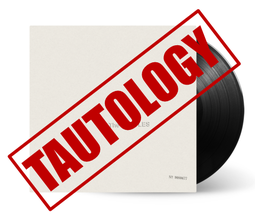|
Thank you, whoever requested this word, because I learned a new term because of you! A gretchenfrage is a blunt, direct question that cuts to the point, often in a theological sense. And its etymology is fascinating! It goes back to Goethe's quintessential play, Faust, where the eponymous antihero is asked by his lover, "what is your take on religion?". This was a relevant question for many reasons. First, as several know already, Faust had a bargain with the devil. Second, the lover's name was Gretchen, and the word for "question" in German is frage. So this tough, often religious question of gretchenfrage really means "Gretchen's question". Gretchen is a nickname for Margaret, which, through Latin and French, eventually traces to a Greek word meaning "pearl" (from Iranian). Frage is from Middle High German vragen, from Old High German frahen. This is from Proto-Germanic fregnana, and the definition finally changes as we go further back to Proto-Indo-European prek, which carried a double meaning of "to woo". So, in response to the gretchenfrage on gretchenfrage, it means "wooing pearls".
3 Comments
The mastodon was named in 1813 by Georges Cuvier, who clearly had his mind on one thing. To create this new genus name, Cuvier combined the Greek word mastos, meaning "breast", and "dontos", meaning "tooth". The word itself literally had the denotation of "breast-tooth", and was meant to describe how mastodon teeth have tiny nubs on their teeth, not altogether un-mammary-esque. Mastos (which in Greek was particular to the female breast, and you may recognize it from mastectomy) comes from the Proto-Indo-European word mad, or "dripping", a connection to milk. Meanwhile, dontos is directly from the Proto-Indo-European root dent, which meant "teeth", plural. You may recognize it from orthodontics and other such terms. Usage of the word mastodon is on the decline since the early twentieth century.
Despite the façade of a simple Germanic word, the term cheap has undergone some serious alterations. In Middle English it took the forms of cheep, chepe, chepen, ceapien, chep, and chapien. Meanwhile, the semantics were changing as well. Moving backward, it went from meaning “low-priced goods” to “a bargain” to “purchasing” in general to a “market”, where purchases were made. So, etymologically speaking, if you were to purchase cheap goods at a market, you could cheap cheap cheap at a cheap. Eventually, this hodgepodge came from Old English ceapian (“to buy”, worsening the mess), and that derives from Proto-Germanic kaupona, also “to buy”. Then, things get linguistically confusing also. Most Proto-Germanic words just go straight back to Proto-Indo-European, but this one is from Latin caupus, an “innkeeper”, which maybe from Pre-Mediterranean.
I chose this word in honor of the recent referendums in Kurdistan and Catalonia. Secede came to English in 1702, not as a word describing countries breaking away, but on a more personal level, meaning something more like "leaving your friends". However, especially later that century, with the Austrian Secession and Revolutionary War, the word gained traction as meaning "leaving your country" on a whole. Before English, secede derives from Latin secedere, or "to separate". This is an affixation of se- (from the general Proto-Indo-European modifier sed), a prefix meaning "apart" and cedere, the root and verb, which meant "to go" and, through Proto-Italic kezdo, comes from Proto-Indo-European ked, "to go away". Usage of secede seems to be decreasing these days, and of course the highest spike in mentions was in the 1860s (history made its impact).
It's not just a Beatles record! White Album is also a tautology! Album, you see, traces all the way back to the Proto-Indo-European root helbos, meaning "white". How did this happen? Well, after a muddle in Proto-Italic, helbos became the Latin word albus, which also meant "white" (and you may recognize it as Dumbledore's first name). This became the Latin word album, or "white writing tablet", which, when paper was brought to Europe, transitioned into album, "list of paper", since paper was white and you wrote on it, I suppose. Eventually, it came to mean "a collection", of writings and (by the mid-nineteenth century) photos, still a modern definition. Not too far of a stretch. Finally, when the gramophone records started coming out post-World War II, people decided to name them albums, an instance of metonymy, since the sleeves those records came in were white sheaths reminiscent of those on more old-fashioned albums. Funny how things work out in etymology!
Cretin is a word used today as "idiot", but cretinism also refers to people with the medical condition of hypothyroidism, caused by iodine deficiency. This was the earlier definition. In the Middle Ages, people who lived in the Alps tended to be low in iodine. Thus, cretins were born, named crestin in the Franco-Italian region. The word crestin, surprisingly, came from Vulgar Latin christianus, which meant "Christian"! This was for a very inclusive and nice reason: in a surprising show of tolerance, people realized that, despite looking different, cretins were good humans too, and since good humans are Christians, why not label them as such? Christianus traces to Christus, the name for Jesus, and you can get the etymology of that if you look at the post for Christmas. Speeding up to today, a nice, inclusive display by Middle Age denizens of the Alps turned into an insult, just because cretins looked different. Who knows? Perhaps we're getting more barbaric.
|
AUTHORHello! I'm Adam Aleksic. I have a linguistics degree from Harvard University, where I co-founded the Harvard Undergraduate Linguistics Society and wrote my thesis on Serbo-Croatian language policy. In addition to etymology, I also really enjoy traveling, trivia, philosophy, board games, conlanging, and art history.
Archives
December 2023
TAGS |



